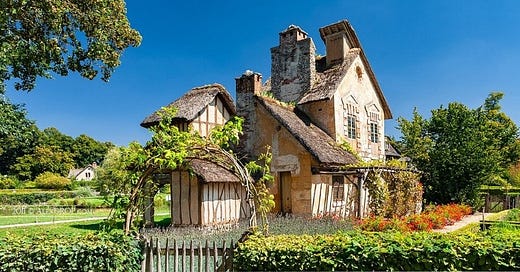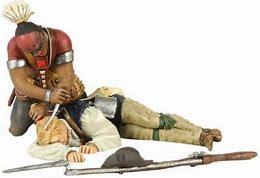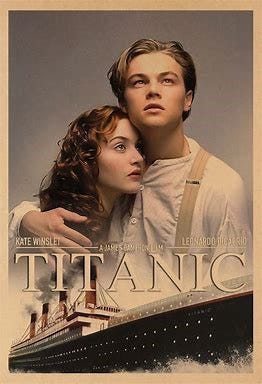“…if we have anything to learn from the Noble Savage, it is what to avoid. His virtues are a fable; his happiness is a delusion; his nobility, nonsense.”
- Charles Dickens around 1840 -
What was an obvious absurdity to Charles Dickens, continues to fire the muddled fantasies of utopians. The tenacity of the concept of elevating the habits, attitudes and accomplishments of backward illiterates over those of western civilization, confirms once again that people would rather believe than know.
Romanticizing primitives has been around a long time.
One fine day in 1749, Jean Jacques Rousseau was reading a newspaper while walking in a French forest. While others rode on horses or in carriages, Rousseau preferred to walk. He was one with nature. He had a deep and abiding love for the trees, mountains, streams, flowers, birds, animals and fish; they were like an elixir to him. He felt that nature was the foundation of life, not cities with their phony sophistication, atheism, theater, parties and salons. Life was in the earth and in the streams.
He preferred nature to people. When "obliged to speak," he tells us, "l infallibly say something stupid." He was wracked by fear and insecurity. “Everything frightens and discourages me," he wrote.
Rousseau was a wandering soul: lost, depressed, vague, murky, bitter, angry and at odds with everyone and everything. He wallowed in self-pity and craved sympathy. He had delusions of grandeur and saw a conspiracy behind every tree. He felt persecuted, unloved and unappreciated. In the end he cried out to his detractors, 'Posterity will honor me and bless my memory, because that is my due."
He was right on the first count, wrong on the second.
On that solitary walk in the woods in 1749, he came across word of an essay contest and was immediately overcome by a blinding realization of his destiny.
"Ah, if ever I could have written a quarter of what I saw and felt under that tree, with what clarity I could have brought out all the contradiction of our social system! With what simplicity I should have demonstrated that man is by nature good, and that only our institutions have made him bad. "
Rousseau's experience had all the trappings of a religious conversion. He had seen the burning bush and was off on a holy mission to spread the gospel that "God makes all things good, man meddles with them and they become evil." We are born innocent but society corrupts us and turns us into monsters.
His mantra ws simple: Nature good, civilization bad.
Rousseau created the theoretical savage who lives a pure, unfettered, healthy and happy life in a condition of pristine simplicity. Projecting himself into this philosophical fantasy, Rousseau describes this noble savage as a solitary individual needing neither speech nor social interaction. He had no desire to create, innovate or invent. “The free-flowing savage,” like his creator, roamed alone; he was spared war, jealousy and hatred. His was a world of innocence and equality. He was active, healthy, vigorous and fleet of foot; ignorant but happy.
How then did this noble savage become modern man who "destroys and defaces all things?" Rousseau had an answer:
The first man who, having enclosed a piece of ground, bethought himself of saying, "This is mine," and found people simple enough to believe him, was the real founder of civil society.
Private property was the root of all evil. It led to "crimes, wars... murders ...horrors and misfortunes." Governments formed to protect private property, and in the process, created restrictions on the individual. Social classes developed. The privileged few enslaved the masses. Living in communities led to innovation and technological advancement, and as a result, the healthy savage became sedentary; he lost his strength and ferocity. Hypocrisy, phoniness and the facades of civilization replaced the ingenuousness of the friendly, flowing savage. Sincerity died.
The growth of civilization, Rousseau continues, and the rise of the arts and sciences have led us into slavery and depravity and renders "effeminate." Astronomy, geometry, physics and all other knowledge serve no positive purpose. "Let men learn for once," he preached, "that nature would have preserved them from science as a mother snatches a dangerous weapon from the hands of her child." He entreated, "Almighty God," to "give us back ignorance, innocence and poverty which alone can make us happy."
Anyone volunteering for Rousseau’s version of happiness?
Deliver us from this urban enlightenment which is nothing more than a "uniform and deceitful veil of politeness" which hides "jealousy, suspicion, fear, coldness, reserve, hatred and fraud."
Rousseau was a genius; he was also an idiot. Rousseau, who owes his continuing fame to the printed word, wrote, “I hate books, for they only teach people to talk about what they do not understand.” (A little knowledge is a dangerous thing, is that it? Well, a little knowledge is a lot better than a lot of ignorance).
His thoughts were amongst the grist leading to the bloody French Revolution. When Napoleon visited his grave, he muttered, “it would have been better if neither of us had been born.” Rousseau’s thoughts provided philosophical justification for the Revolution; Napoleon brought order to the chaos of revolution, then brought war, chaos and death to Europe.
Rousseau was a social misfit who despised civilization. He was a true believer in his owl belief system. He was the prototype of the back-to-nature environmentalist. In his heart of hearts, he loathed the society that intimidated him. He wanted to be a noble savage among other noble savages, hiding his insecurities in an egalitarian oneness.
Broken into its essence, Rousseau is saying the following:
1. Man is born good and free.
2. Man in a state of nature is happy.
3. Primitive people are better off than civilized people.
4. The natural environment is pure and sacred.
5. Private property is the cause of man's depravity.
6. All political, economic, social and moral inequalities are unnatural.
7. Social classes and privilege are unnatural.
8. Civilization is dehumanizing.
9. Knowledge is dangerous; ignorance is bliss.
10. Poverty is noble.
Although his ramblings were fanciful nonsense, they had great popular appeal. Marie Antoinette and her friends sometimes dressed up as young shepherdess or milkmaids and wandered around a specially built hamlet pretending to be peasants, while still surrounded by the comforts of aristocracy. The Queen sometimes milked the cows and sheep to get a taste of village life. The “villagers” would wash the goats and dress them in ribbons. Playacting the simple life was fun: Disneyland for royalty. Nothing was real. Except perhaps the guillotine, not long after.
The Mill, one of the structures in Hameau de la Reine, was make believe, a life-sized structure in which the Queen and her friends playacted the beauties of peasant life. Image credit: Alex Drop/Flickr
Substack Sidebar
When I was thirty, I took a sabbatical camping in Europe where I wrote the next Great American Novel. (Turns out it wasn’t all that great.) Many of the young people I met were proud of living on a shoestring. “I’m almost out of money, but just making it,” one twenty-year-old told me. “I crashed in a pad in Zurich,” said another. I came across a couple, best described as “hippies,” camping off the beaten track by a stream. We talked about how the Mets were doing back in New York. “This is all we have,” he said, motioning to their tent and a few camping items. Poverty and struggle were popular identity postures. I hung out with two medical students in Marrakesh, Morocco, who offered me a smoke of hashish. (I declined.) They were not poor. Like many, they had Icelandic Airlines tickets to the States in their backpacks.
Although much of Rousseau’s thought is dreamy, impractical and hypothetical, it has had a tremendous impact. Gustav Lamnson suggests that "...all the progress of democracy, equality, universal suffrage... the war against wealth and poverty, all the agitations of the working and suffering masses, have been in a sense the work of Rousseau." His ideas helped ignite the French Revolution. When Karl Marx wrote his Communist manifesto, Rousseau was whispering in his ear. Dividing the world into haves and have nots, became a widespread rationale for class warfare and revolution.
Rousseau Stands Tall in Today’s Misguided West
After 250 years, the myth of the noble savage continues its romantic appeal to modern “thinkers,” and creeps into our lives in all sorts of ways. Stretching to raise the IQ of primitives, for example, The National Council of Teachers of Mathematics pointed out, “Quilt patterns and ancient bone cut with marks that may have been used for counting, show that backward peoples knew their math.” Really?
We need quotas to level the playing field.
Private property is the root of all evil; land should belong to everyone. You’ll own nothing and you’ll be happy, announced The World Economic Forum in 2016.
Lyndon Johnson’s war against poverty cost $23 trillion (adjusted for inflation) yet nothing has changed besides the national debt.
Moratoriums on evictions helps the propertyless over the property owners.
The rich don't pay their fair share of taxes.
The sacredness of the natural environment - let's put the loggers out of business to save the spotted owl.
Global warming is destroying the earth.
Criminals are the victims of society.
Primitive people are inherently wiser than civilized.
Recognizing valedictorians at graduations is discriminatory and makes other students feel sad.
Socialism is fair; Capitalism is theft.
As we sit in movie theaters, awed by special effects on the big screen, films fill our heads with noble savage fantasies, extolling pre-historic level primitives, while denigrating western civilization.
Titanic – romanticized the virtues of the poor and the callousness of the rich. Jack and Rose and the other commoners in steerage were noble, brave, smart, fun-loving, happy, honorable, earthy, genuine and sexy. Most of the wealthy folks on the ship were selfish, callous, cold, cowardly and arrogant. The poor are self-sacrificing, the rich are self-serving.
Although Rose and Jack are only seventeen, they are wiser than adults. When Jack sits down to dinner with them rich folks, he cleverly trades them tit-for-tat. Instead of mumbling like a slack-jawed teenage, he is cleverer than they. The messages are pure Rousseau: rich are bad, poor are good; Rose contemplated suicide. because she was so miserable in her wealthy life.
Titanic grossed $2.6 billion.
2. Dances With Wolves – Kevin Costner’s film was entertaining and very well done as it portrayed the Native Americans as kind, peaceful bucolics; the women peacefully gathered flowers, berries and nuts in baskets. The cavalry of white men were nasty, condescending killers. Eventually, Costner a cavalry man “goes Indian,” preferring the virtuous Indians to the white world. You know the mantra:
Oppressors and oppressed
Civilization brutal, primitives’ kind, loyal and virtuous.
Substack Sidebar
In fairness to Costner’s ode to illiterate, nomadic primitives, many women and children kidnapped by the Indians, adopted their culture, and in effect became Indians. In some cases, they refused to return to the white world.
Planet of the Apes – In the original film, astronaut Charlton Heston crashes on a future Earth where the apes are civilized and intelligent, while the humans are mute animals. Subsequent Planet of the Apes prequels, with increasingly spectacular special effects, show how primates of every kind took over the Earth. To tell you the truth, I always root for the people. I don’t want the gorillas, baboons and monkeys to obliterate human beings. In the end, the apes win, people lose; the oppressed rise up and obliterate the oppressors. All’s well in this Marxist fantasy.
4. Avatar – Bad enough that the poor are better than the rich, the Indians are more noble than the cavalry, and the Apes liquidate humans. What could be next? Aliens. Yes indeed, in another James Cameron masterpiece, the noble, primitive, tree dwelling, nine-foot aliens, are exploited by greedy earth capitalists in their spaceships, while the nasty military help the exploiters. The aliens are primitives thriving in a beautiful, natural world. They interact with the wildlife in a symbiotic oneness. The aliens just want to be left in peace, to climb trees, make love and eat. Earth people are callous, profit-driven capitalist imperialists, aliens are exploited victims.
These films were written by Rousseau, produced by Marx, and directed by Lenin, Stalin and Mao. They included a cast of millions, all of whom were murdered.
Writing in Ayn Rand’s Return of the Primitive, Peter Schwartz wrote that the left “reject(‘s) the view that the achievements of Western — i.e., individualistic - civilization represent a way of life superior to that of savage tribalism.”








Maybe he would have been happy as an Apache.